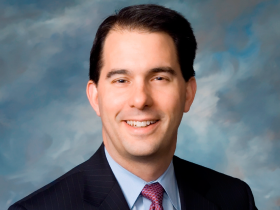How Walker Worries About Polls
His book shows he frequently adjusts strategy based on poll results.
Every 17 years, it seems, a Republican governor of Wisconsin chafing to make the A-list of his party’s future presidential contenders writes a book on how their successes in Cheesehead Land could be a model for the nation.
That’s why Americans were treated to “Power to the People” in 1996 by then-Republican Gov. Tommy G. Thompson.
And it’s why current Gov. Scott Walker is making the rounds nationally, doing talk shows, interviews and speeches elaborating on his new book, “Unintimidated,” about the political history – and the choices Walker made – in our Capitol in 2011 and 2012.
Those two years saw his Act 10 that all but abolished public employee bargaining become law, his side winning a Supreme Court campaign that became a referendum on Act 10, and a record 13 recall elections.
Walker, Lt. Gov. Rebecca Kleefisch and eight state senators kept their jobs in those recalls, but three GOP senators were turned out of office.
Among the new, interesting information in Walker’s book is this: He is welded to – and governs by – public-opinion polls. There are about 28 references to polls, including “internal” polls seen only by Walker and his closest political aides and exit polls in “Unintimidated.”
Only a few individuals got more references in the book. There are 40 shout-outs to Walker’s wife, Tonnette, who the governor says was his “rock” during the trials of 2011-12. Their sons, Matt and Alex, are mentioned about that often.
There are also 47 references to 2012 Republican party presidential candidate Mitt Romney, who Walker says failed to learn any lessons from his political courage and candor. Others names dropped are Senate Majority Leader Scott Fitzgerald, 31 references; then-Assembly Speaker Jeff Fitzgerald, 17; Senate President Mike Ellis, 15; political adviser R.J. Johnson, 7; public employee labor leader Marty Beil, who Walker says learned “absolutely nothing” from his political defeats, 6; Thompson, 4, and Kleefisch, 2.
Walker and co-author Marc Thiessen add: “If you know you are doing the right thing, and the polls say voters disagree, change the polls, not your principles. President Reagan used to look at polls not to determine his positions, but to see where he needed to do more to persuade the public. That’s a sign of true leadership.”
Reagan – 30 references in the book – is Walker’s personal and political idol.
Examples of the role that public-opinion polls played in Walker’s 2011-12 decisions and political life:
*”Seven days out, our internal polls showed (Supreme Court Justice David) Prosser was losing by five to six points” to Department of Justice veteran attorney Joanne Kloppenburg in the April 2011 election. (Page 125). What did Walker see as the stakes in the Prosser-Kloppenburg race? “While I was not on the ballot that day, my political fate – and the fate of our reforms certainly were and we won.”
*Once the June 2012 recall election for Walker was set, “I was extremely vulnerable. Our internal polls showed that 54% of voters viewed me unfavorably, and that my likely opponent, Milwaukee Mayor Tom Barrett, would defeat me decisively in a head-to-head matchup.” (Page 142)
*Polls conducted five weeks apart told Walker he could win the recall, however: “One Dec. 19, 2011, our internal polls had showed me losing the recall by an 11-point margin, 54-43%. By Jan. 23, 2012, after three weeks on the air with the new ad, we pulled ahead for the first time, 47-46. (Page 163)
*Polls also told Walker that, despite the prayers they offered together, former Republican Sen. Dan Kapanke, who voted for Act 10, would be recalled in the summer of 2011. ‘The truth is, Dan had no chance of winning. Even before the vote on Act 10, his poll numbers were upside down.” (Page 136)
What’s it all mean?
Often, Walker – and almost every other veteran pol – offer this tired old response when asked about the latest poll measuring public opinion on them or one of their priorities: “I don’t care about the polls…The only poll that matters is on election day.”
But Walker’s book proves one point: Polls intimidate him.
Steven Walters is a senior producer for the nonprofit public affairs channel WisconsinEye. Email stevenscwalters@gmail.com
The State of Politics
-
A Wisconsin Political Trivia Quiz
 Dec 15th, 2025 by Steven Walters
Dec 15th, 2025 by Steven Walters
-
The Fight Over Wisconsin’s House Districts
 Dec 8th, 2025 by Steven Walters
Dec 8th, 2025 by Steven Walters
-
The Battle Over On-Line Betting
 Nov 24th, 2025 by Steven Walters
Nov 24th, 2025 by Steven Walters






















What does not intimidate him? He sneaks through his tunnel to get in and out of the Capitol. He has screens put up when he moves from one part of the Capitol to another…
Well if Rush is a beacon of evidence, then right-wingers flock to narcissism, naked ambition, and self promotion as values, his book is right up their alley.
Ted, the sad thing is that Walker needs greater security due to the numerous threats to him and his family that have been made by people who disagree with his policies.
I just want to acknowledge that it’s been 50 years since the assasination of Kennedy.
You are correct Ted. Now what does that have to do with anything?